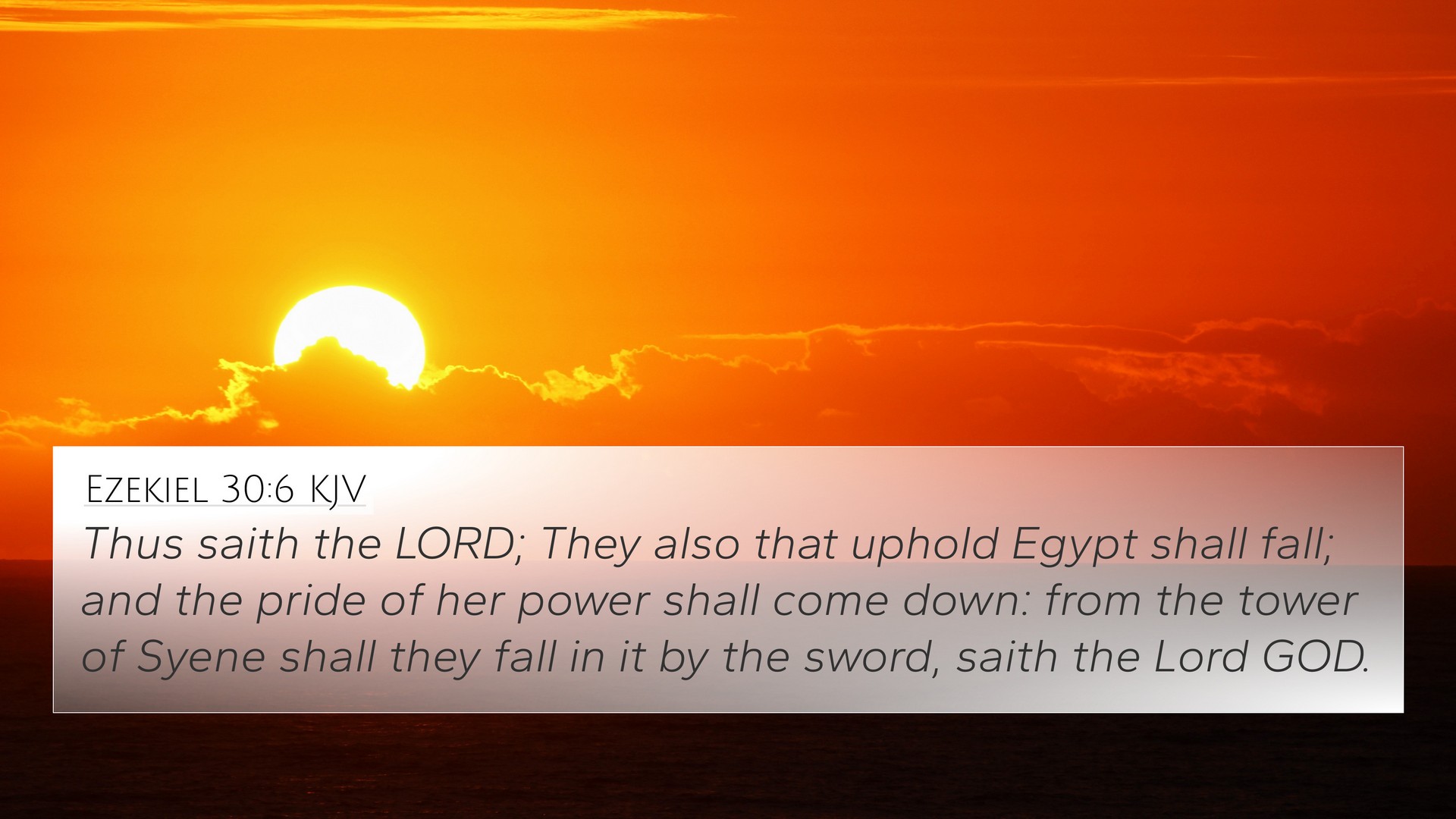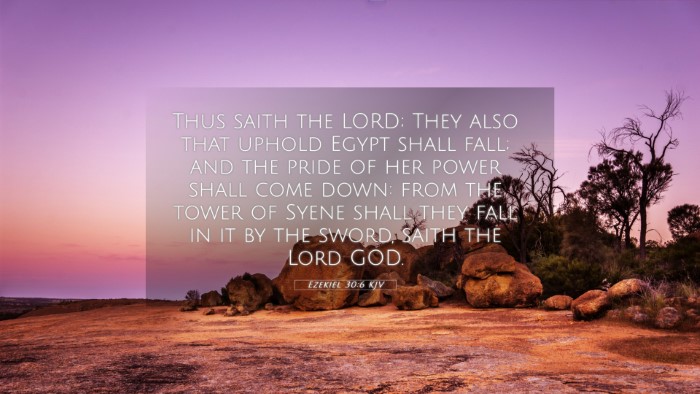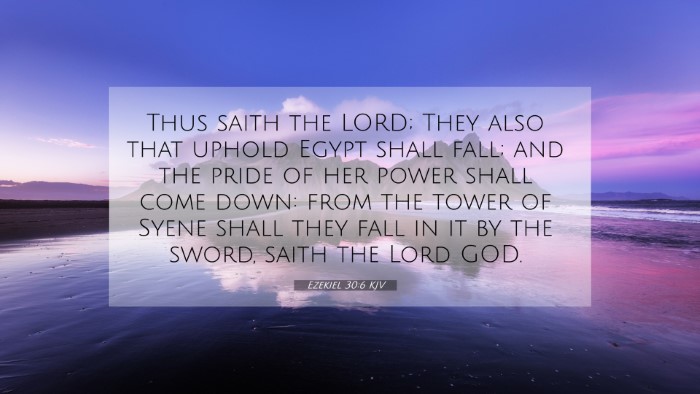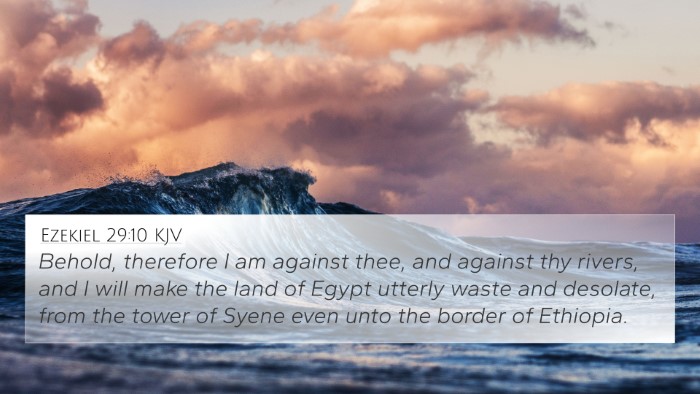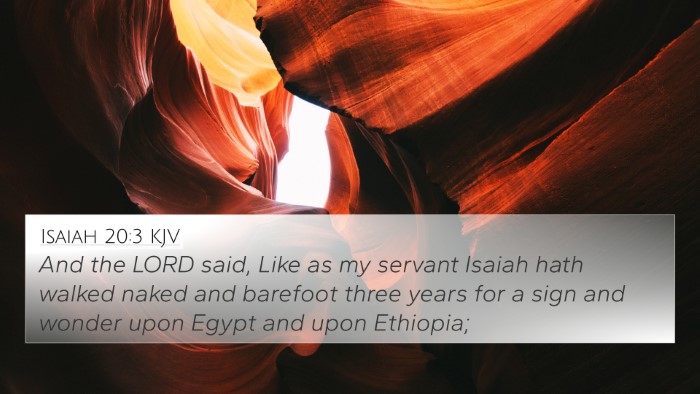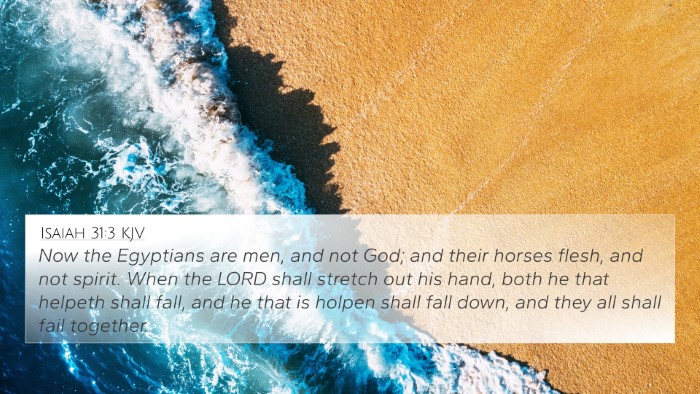Ezekiel 30:6 - Commentary & Interpretation
Ezekiel 30:6 states:
"Thus saith the Lord; They also that uphold Egypt shall fall; and the pride of her power shall come down: from the tower of Syene shall they fall in it by the sword, saith the Lord God."
The verse highlights the impending judgment upon Egypt and those who depend on her strength. It serves as a strong warning regarding the futility of relying on earthly powers.
Summary of Insights from Public Domain Commentaries
This verse has been explored in significant detail by various commentators including Matthew Henry, Adam Clarke, and Albert Barnes. Below are summarized insights drawn from their works, illustrating the meaning and implications of Ezekiel 30:6.
1. Matthew Henry's Commentary
Matthew Henry emphasizes the pronouncement of divine judgment against Egypt and its allies. He notes:
- Judgment on Pride: The verse indicates that the pride of Egypt, regarded as a great power, will be brought low.
- The Tower of Syene: This reference signifies both a geographical and symbolic point of strength; its downfall represents the total collapse of Egyptian power.
- Immediate Consequences: The fall of those who support Egypt serves as a reminder of the transient nature of earthly alliances during divine judgment.
2. Adam Clarke's Commentary
Adam Clarke offers a detailed examination, providing historical context and theological insights:
- Historical Context: Clarke notes that the reference to Syene is geographic, pinpointing a place that was a stronghold in Upper Egypt.
- The Nature of Alliances: He highlights that those who relied on Egypt will similarly fall, signifying the interconnectedness of divine judgment on nations.
- Symbolism of the Sword: The use of 'sword' symbolizes military defeat, indicating that God’s judgment will be carried out through warfare.
3. Albert Barnes' Commentary
Albert Barnes expands on the prophetic nature of the passage:
- Prophetic Warning: He points out that this prophecy is a warning not only to Egypt but also to those who trust in human strength rather than divine might.
- Encouragement for Israel: This passage reassures Israel that they will not be forsaken even while their enemies face judgment.
- Connections to Other Scriptures: Barnes connects this passage to themes found throughout scripture regarding the downfall of nations that oppose God.
Cross-References to Ezekiel 30:6
Several other Bible verses relate thematically to Ezekiel 30:6. Below is a list of cross-references that illustrate the interconnected messages found within the Word of God:
- Isaiah 19:1: This verse discusses the judgment against Egypt, reinforcing the themes found in Ezekiel.
- Isaiah 31:1: A warning against relying on Egypt for help, affirming the same sentiment as Ezekiel.
- Jeremiah 46:1-2: Contains prophecies concerning Egypt, showing God's impending judgment.
- Ezekiel 29:6-7: Similar calls for judgment on Egypt are found earlier in Ezekiel.
- Ezekiel 32:1-15: Further elaboration on the fall of Egypt and its allies.
- Psalms 37:20: Discusses the fate of those who oppose God, linking to the theme of pride before downfall.
- Revelation 16:18: Although apocalyptic in nature, it reflects on God's power against those who oppose Him.
Thematic Connections and Analysis
Cross-referencing these Bible verses highlights several recurring themes:
- Divine Judgment: A consistent theme across these verses is God's judgment upon nations and powers that lift themselves against Him.
- Reliance on Earthly Powers: Many scriptures echo the sentiment of trusting in the Lord over human strength.
- Historical Relevance: The records of Egypt's pride and subsequent downfall serve as a warning to all nations.
- Encouragement for God's People: Amidst judgment, there lies a hope and reassurance for those who are faithful.
Conclusion
Ezekiel 30:6 serves as a poignant reminder of the consequences of pride and the fleeting nature of human power in the face of divine authority. Through examining this verse and its connections, we gain a deeper appreciation for the scriptural narrative of judgment, reliance, and salvation throughout the Bible. The insights from various commentaries offer rich layers of understanding, emphasizing the importance of being anchored in faith rather than human alliances.
